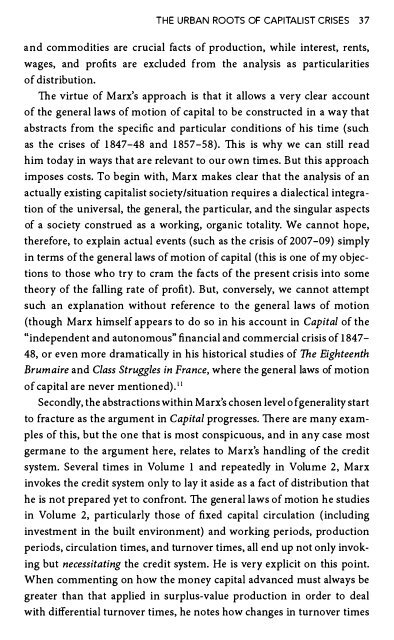Rebel Cities-David Harvey
Rebel Cities-David Harvey
Rebel Cities-David Harvey
- No tags were found...
Create successful ePaper yourself
Turn your PDF publications into a flip-book with our unique Google optimized e-Paper software.
THE URBAN ROOTS OF CAPITALIST CRISES 37and commodities are crucial fa cts of production, while interest, rents,wages, and profits are excluded from the analysis as particularitiesof distribution.The virtue of Marx's approach is that it allows a very dear accountof the general laws of motion of capital to be constructed in a way thatabstracts from the specific and particular conditions of his time (suchas the crises of 1847-48 and 1857-58). This is why we can still readhim today in ways that are relevant to our own tim es. But this approachimposes costs. To begin with, Marx makes clear that the analysis of anactually existing capitalist society/situation requires a dialectical integrationof the universal, the general, the particular, and the singular aspectsof a society construed as a working, organic totality. We cannot hope,therefore, to explain actual events (such as the crisis of 2007-09) simplyin terms of the general laws of motion of capital (this is one of my objectionsto those who try to cram the facts of the present crisis into sometheory of the falling rate of profit). But, conversely, we cannot attemptsuch an explanation without reference to the general laws of motion(though Marx himself appears to do so in his account in Capital of the"independent and autonomous" financial and commercial crisis of 1847-48, or even more dramatically in his historical studies of The EighteenthBrumaire and Class Struggles in France, where the general laws of motionof capital are never mentioned) .11Secondly, the abstractions within Marx's chosen level of generality startto fracture as the argument in Capital progresses. There are many examplesof this, but the one that is most conspicuous, and in any case mostgermane to the argument here, relates to Marx's handling of the creditsystem. Several times in Volume 1 and repeatedly in Volume 2, Marxinvokes the credit system only to lay it aside as a fact of distribution thathe is not prepared yet to confront. The general laws of motion he studiesin Volume 2, particularly those of fixed capital circulation (includinginvestment in the built environment) and working periods, productionperiods, circulation times, and turnover times, all end up not only invokingbut necessitating the credit system. He is very explicit on this point.When commenting on how the money capital advanced must always begreater than that applied in surplus-value production in order to dealwith differential turnover times, he notes how changes in turnover times


